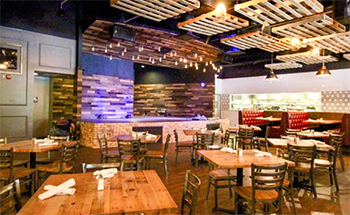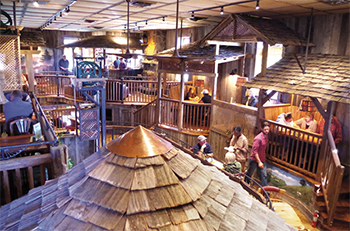5 Unassuming Small Businesses That Hid Big-Time Scams

It's always kind to frequent small businesses, but there's always the risk that they might turn out to be running game on you. You can't be sure that rustic veggie stand isn't selling cherry tomatoes that are just spray painted ping-pong balls. And any stay at a charming little B&B runs the possibility of the owner's inbred bat-son frantically licking the other side of your room's secret two-way mirror.
Now while those concerns might seem unlikely, some unremarkable small shops and businesses truly were hiding some twisted grifts ...
An Online Glasses Retailer Waged A Campaign Of Harassment Against Its Own Customers To Boost Its Search Rankings
DecorMyEyes was an online eyeglasses retailer run by New Yorker/Grand Theft Auto side-character Vitaly Borker. The company resold "designer" glasses and sunglasses using a bizarre scam that thrust countless unsuspecting buyers into an actual horror movie. According to Borker, the company started legit until he lost his temper and snapped at a few customers. To his surprise, their negative reviews caused his search rankings to improve. It pointed out a hole in Google's algorithm -- they boosted your search ranking the more your site was discussed, regardless of it being positive or negative. And so he began a bizarre reign of terror against his own customers.
Don't Miss
As soon as a shopper complained about his shitty knockoffs, Borker would go completely insane. He would call them up and scream at them, bombard them with emails and fake lawsuits, harass them at 3 AM, and fraudulently charge their card. He told one buyer he would chop his legs off, threatened another with rape, and sent a third person intimidating photos of her house from Google Earth. Poor people that just wanted some goddamn RayBans found themselves dealing with the online equivalent of Robert de Niro in Cape Fear. All the while, Borker was basically daring them to complain online. So they did.
Social media and review sites quickly filled with nightmarish warnings never to do business with DecorMyEyes. Whole communities formed for the victims to comfort each other, only for Borker to show up and taunt them on forums. Soon, just Googling "DecorMyEyes" would turn up pages and pages of horror stories, which was precisely what Borker wanted since he was counting on the constant negative discussion to boost his site up the search rankings. And it worked.
See people don't actually try to buy glasses by Googling some random reseller, so they never saw the DecorMyEyes reviews. Instead, buyers would search for the name of a luxury glasses brand, which would turn up the DecorMyEyes page as the top result, often above the designer's own site. Borker was also careful to attack only a few shoppers per month, keeping him below the complaints threshold for being banned by most credit card companies.
He kept this up for years until the New York Times did a story exposing the whole thing. Borker subsequently went to prison, while Google changed its algorithm to be slightly better at discouraging pure evil.
An Antique Shop Secretly Made Thousands By Shaking Down People Who Parked Outside
Bashford Antiques seemed to be a typical antique shop located in a trendy suburb of Auckland, New Zealand. At worst, you'd have expected it to hide a haunted marionette or two. But, behind the scenes, one of the owners was a bankrupt sex shop owner, previously jailed for pretending to be a European prince in order to steal a yacht. When that was your starting point, it shouldn't have been a surprise when it turned out that the antique store was just a front for a parking shakedown that terrorized the entire neighborhood and raked in thousands of dollars.
Bashford had four parking spots outside the store, and a carefully obscured sign labeling them as being for customers only. The owners would lurk inside the shop, peering out the windows, waiting for prey to wander into their trap. As soon as unsuspecting drivers parked and left their cars, they'd race out to slap on a tire clamp and aggressively demand hundreds of dollars to remove it.
Bashford would even put traffic cones in nearby parking spots to shepherd even more unsuspecting victims. The clampers also claimed to be from "Premiere Clamping Services," but that company didn't exist -- it was just a front for Bashford. A single Italian restaurant a few doors down complained that up to six customers per night were being abusively shook down for $220-to-$760 NZD ($145-to-$500 USD).
The crazy part is that this was deemed legal -- Bashford could clamp cars parked on their property and charge whatever hell they wanted. Eventually, Bashford's clamping got so out of hand that it almost single-handedly kickstarted a push to pass a law capping clamping fees. The media coverage also exposed that Bashford was operating without a license to sell antiques. The store closed down in 2018, although the owners are still briefly resurfaced to harass the journalist who exposed their shady asses.
An Indie Game Sold On Steam Was Secretly Using Your Computer To Mine Cryptocurrency
In the old days, buying video games was something of an ordeal. Cheaper indie games were sold exclusively from the trunk of a bullet-riddled Volvo by a man with an unsecured rattlesnake and a hunting knife. Then Steam came along, promising to make it easy and safe to buy games online. This was a windfall for smaller developers, who could now easily reach customers. But it was also a windfall for a group of scammers, who realized they could pose as one of those companies and seize control of your computer.
That leads us to Okalo Union, a supposed small game developer that produced Abstractism, a "chill-out" platform game with an ASMR soundtrack, and "no Game Over." The dirt-cheap game was marketed through Steam, where it blended in perfectly among hundreds of other indie offerings. It was downloaded by over 6,000 Steam users, many of which noticed that it seemed to use inexplicably huge amounts of disc space and processing power. This was especially suspicious because the game itself was pretty basic, with no obvious features that would leave your computer thrumming like an airplane engine eight seconds into an unexpected flock of geese.

That's because the game was just a front -- Abstractism was using your computer to mine cryptocurrency. Because the field of crypto scams wasn't rich enough already, we now get to introduce you to something called "cryptojacking." Mining crypto requires tons of processing power and electricity, so hackers are increasingly trying to infect devices with malware that uses your power to do all the mining while sending them the resulting currency.
Okalo Union's game was particularly intriguing because it wasn't just a front for the malware; it was designed to facilitate the cryptojacking itself. It featured random item drops that you could maximize if you kept the game running "constantly and at specific times." You could have been a random Steam user happily downloading a new indie, when *boom* your computer begins glowing like a blast furnace, shitting out litecoin for some distant cryptodouche.
Stamford's Rascal Flatts-themed Restaurant Was A Multi-Million Dollar Scam Run By A Mobster In Witness Protection
From 2017 to 2018, Stamford, Connecticut was home to the nation's first, only, and last Rascal Flatts restaurant -- a southern comfort food spot themed around the southern comfort band. Google reviews describe Rascal Flatts (the restaurant) as "ok" and "a good alternative to Cheesecake Factory," which conveniently double as above-average reviews of Rascal Flatts (the band). In reality, the restaurant was part of a massive fraud scheme run by a former Lucchese Family gangster, who used his time in witness protection to hoodwink multiple country music stars into launching phony restaurant chains.
Rascal Flatts had unknowingly partnered with Frank Capri, a former crime boss who had been hiding out in federal witness protection since testifying against the mob. Capri and his partners signed a deal with the band to start a branded restaurant chain, then persuaded mall developers across the country to fork over millions of dollars in exchange for opening Rascal Flatts restaurants inside their malls. For some reason, the mall magnates were convinced that people would be crawling over each other in a human wave to gnaw on chicken blessed by the guys who sang "What Hurts The Most."

The Stamford show location was the only one finished, with Capri simply stealing the money earmarked for 19 other sites. Recordings show an enraged Capri using threats to intimidate suppliers and developers into paying construction money directly to him. Imagine how disorienting it would be to accept a job from Rascal Flatts' business partner and discover he's basically Joe Pesci in Casino. It would be like if Jay-Z's accountant had a hook for a hand and a parrot. Where's the thematic consistency?
And the crazy thing is: this wasn't even the first time. Capri pulled the exact same scheme with Toby Keith's I Love This Bar and Grill. A chain that was supposed to open in malls across the country, before collapsing in 2015 with millions in development money missing (Around 20 Toby Keith restaurants did actually open for a brief period, which were 20 more than the world ever needed.). Capri hid his control of the Rascal Flatts project through his girlfriend and then just pulled the exact same scam. He was arrested earlier this year, although let's hope he beats the charges so we can all look forward to Kenny Chesney's Sizzlin' Barbecue Slop Bucket, opening exclusively in an abandoned Saskatoon strip mall in 2021.
The Charming Cafes Run By A Terrifying Doomsday Cult
The Yellow Deli is a charming rustic cafe, featuring beautifully carved wood furniture and quirky decor. It serves a wholesome, farm-to-table menu whose quality exceeds even the finest of Rascal Flatts' dishes. You could stop at one for a bite to eat, and be on your way, all without realizing that you'd just funded a nightmarish doomsday cult that runs the place by using their unpaid followers as something approaching slave labor. And that exact scenario is true of all their cafes from Vista, California, to Kingston, Ontario to Katoomba, Australia.

Twelve Tribes was founded in 1972 by Gene Spriggs, who believes that black people should be enslaved, gay people should be executed, and that the group must "produce an army of 144,000 male virgins" in preparation for the imminent apocalypse. First of all, producing an army of weirdo virgins is 4chan's job, and secondly, go fuck yourself, Gene. Twelve Tribes is believed to have several thousand members and claims to preach a message of love, although it's unclear how that squares with sermons like "Martin Luther King and others have been inspired by the evil one to have forced equality. Slavery is the only way for some people to be useful in society."
The group is most notorious for child abuse, with children brutally beaten multiple times per day for minor infractions. Kids are forbidden from playing, or having imaginary fantasies, and beaten with a wooden rod for something as simple as "pretending to be an airplane." Any adult is apparently allowed to spank any child without question and former members report being beaten black-and-blue with two-by-fours from a young age. The German government raided the local branch of the sect and took the children into custody in 2013, but a similar raid was ruled unconstitutional in the US.
But how does the cult pay for all the wooden rods and pro-slavery literature? By raising funds through businesses like the "Yellow Deli" cafes and "Blue Blinds" bakeries, which are presumably very profitable, since cult members work there for free. The cafes are by all accounts charming and unsuspicious, aside from a few unobtrusive pamphlets that conveniently leave out all the evil stuff. In fact, when Vice visited the Katoomba location, they noted that only one of over 100 Google reviews mentioned the cult, with other clients seemingly completely unaware.
Top image: Evgeny Bakhchev/Shutterstock